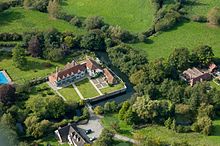Peter Grant (music manager)
[3] Born and largely brought up in the south London suburb of South Norwood, England by his mother, he worked variously as a stagehand, bouncer, wrestler, bit-part actor, and UK tour manager for acts such as Chuck Berry, Gene Vincent and the Animals, before getting involved briefly in band management with the Nashville Teens and the Yardbirds.
Grant was soon attracted to the entertainment industry, and worked as a stagehand for the Croydon Empire Theatre until 1953, when he was called up for national service in the Royal Army Ordnance Corps, reaching the rank of corporal.
[7] He worked briefly as an entertainment manager at a hotel in Jersey before being employed as a bouncer and doorman at London's 2i's Coffee Bar, where Cliff Richard, Adam Faith, Tommy Steele and others got their start.
In 1963, Grant was hired by promoter Don Arden along with John Schatt to be the British tour manager for artists such as Bo Diddley, the Everly Brothers, Little Richard, Brian Hyland, Chuck Berry, Gene Vincent and the Animals.
[citation needed] His management was established in the same 155 Oxford Street office used by his friend, record producer Mickie Most, who had previously worked with Grant at the 2i's Coffee Bar.
Grant travelled closely with the Yardbirds, ensuring that all costs were kept to a minimum, that members were paid on time, and that the band retained artistic control.
After the tour, the agreement to use the name expired, and Chris Dreja wrote Page a "cease and desist" notice, so the group chose the name Led Zeppelin,[11] with Grant assuming the role of their manager.
[15] Led Zeppelin's particular success in the United States can partly be credited to Grant's keen sense of US audiences and the vast underground movement that was sweeping the country.
"[citation needed] Grant's determination to protect the financial interests of Led Zeppelin was also reflected by the sometimes extraordinary measures he took to combat the practice of unauthorized live bootleg recordings.
He is reported to have visited record stores in London that were selling Led Zeppelin bootlegs and demanded all copies be handed over.
[8] This was demonstrated by his decision to never release the popular songs from Led Zeppelin's albums as singles in the UK, out of respect for the band's desire to develop the concept of album-oriented rock.
As was explained by Jones: [Peter] trusted us to get the music together, and then just kept everybody else away, making sure we had the space to do whatever we wanted without interference from anybody – press, record company, promoters.
[8]Grant's past experience in handling stars such as Jerry Lee Lewis and Gene Vincent also provided him with an excellent grounding in managing the pandemonium which frequently surrounded Led Zeppelin, particularly whilst the band was on tour.
"[23] According to rock journalist Steven Rosen: Peter Grant, former bouncer and wrestler, was, in many respects, the physical embodiment of a Led Zeppelin.
Standing over six feet and weighing over 300 pounds, he used his intimidating presence to maintain order and to keep his charges safe and worry-free ... His raison d'etre was simple – protecting his band and their finances.
He was also the driving force in establishing Swan Song Records in 1974, which gave Led Zeppelin further financial and artistic control over its products.
In January 1972, Bernard Chevry, manager of the Midem music business festival wrote to Grant, asking for "Led Zeppelin and his backing group" to appear.
Members of the band returned to their hotel after the concert, and were woken the next morning by a surprise police raid after Graham had changed his mind and decided to press charges.
[33] Bindon, Cole, Grant and Bonham received bail and travelled to New Orleans on 26 July, but the remaining dates on the tour were subsequently cancelled due to the sudden death of Robert Plant's son, Karac, back home in the UK.
[34][35] After months of legal wrangling, Led Zeppelin offered to settle and all four pleaded nolo contendere, receiving suspended sentences and undisclosed fines.
[36] Marital problems, diabetes, cocaine addiction and the death of Led Zeppelin drummer John Bonham all took their toll on Grant's health, and after the official breakup of Led Zeppelin in 1980, and the subsequent folding of the Swan Song label in 1983, he virtually retired from the music business to his private estate in Hellingly, East Sussex.
Grant subsequently sold his estate and moved to nearby Eastbourne, where he was offered the civic position of local magistrate for the town council, but he turned it down.
According to music journalist Mat Snow, "Peter Grant enjoys a proud position in the pantheon of legendary British rock managers.
